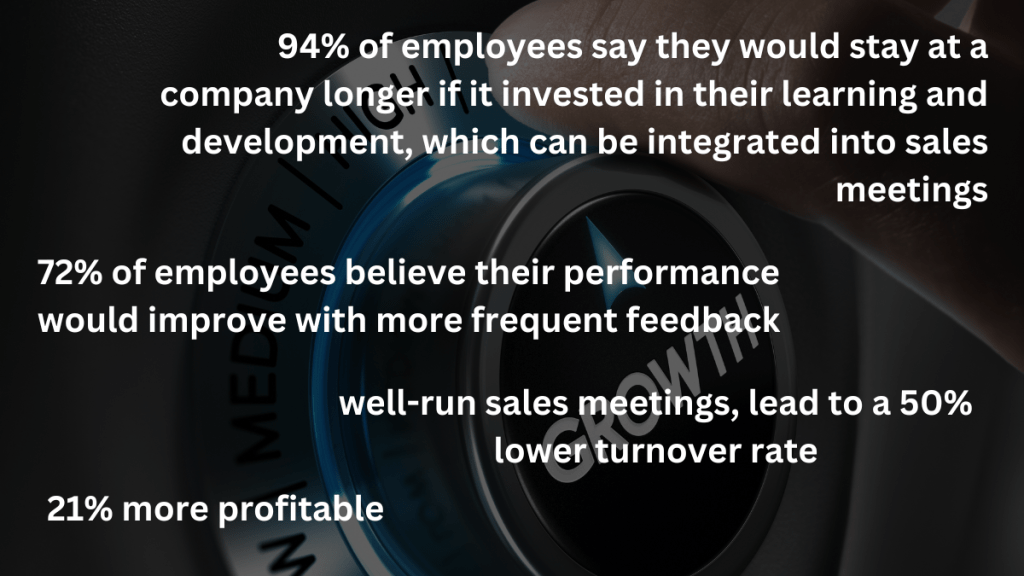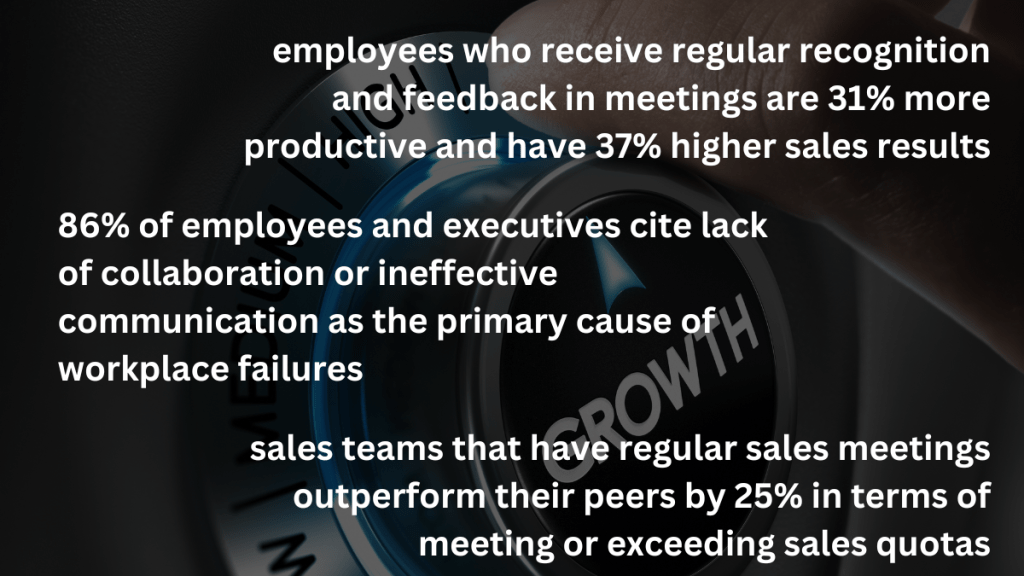Regular Sales Meetings Makes A Difference!
Running effective sales meetings isn’t just a best practice; it has a proven impact on sales performance and team dynamics. Here are some compelling statistics that highlight the benefits:
Increased Sales Performance:
According to a study by HubSpot, sales teams that have regular sales meetings outperform their peers by 25% in terms of meeting or exceeding sales quotas. This highlights the direct impact of structured and consistent meetings on sales outcomes.
Improved Team Alignment:
Research by Salesforce shows that 86% of employees and executives cite lack of collaboration or ineffective communication as the primary cause of workplace failures. Regular sales meetings improve team alignment and collaboration, directly addressing this issue.
Boost in Morale and Motivation:
A survey by Harvard Business Review found that employees who receive regular recognition and feedback in meetings are 31% more productive and have 37% higher sales results. This underscores the importance of incorporating recognition into your meeting agendas.
Enhanced Problem-Solving:
According to Gallup, teams that engage in regular problem-solving sessions as part of their sales meetings are 21% more profitable. This proactive approach to addressing issues can lead to significant financial benefits.
Higher Engagement and Participation:
Data from ClearCompany indicates that 72% of employees believe their performance would improve with more frequent feedback. Regular sales meetings provide the perfect opportunity for this feedback, leading to higher engagement.
Reduction in Employee Turnover:
Effective communication and regular check-ins lead to a 50% lower turnover rate, as reported by Officevibe. This demonstrates the role of sales meetings in employee retention.
Increase in Training Effectiveness:
According to LinkedIn’s Workplace Learning Report, 94% of employees say they would stay at a company longer if it invested in their learning and development. Integrating training into sales meetings can significantly boost retention.
Data-Driven Decision Making:
A study by McKinsey & Company reveals that companies using data and analytics in decision-making processes, often shared in sales meetings, are 23 times more likely to acquire customers and 19 times more likely to be profitable.
Higher Goal Achievement:
A Sales Management Association survey found that sales teams with regular, effective sales meetings achieved 15% higher quota attainment rates compared to those without.

So…
What Makes a Great Sales Meeting?
Running effective sales meetings is crucial for maintaining the momentum and success of high-performance sales teams. These meetings are not just about reviewing numbers; they are an opportunity to motivate, strategise, and address challenges head-on. In this guide, we will delve into the essential topics to cover, how to structure your meetings, and best practices to ensure productive sessions. Let’s dive in!
1. Setting Clear Objectives
Establish the Purpose
Every meeting should have a clear purpose. Whether it’s reviewing the past week’s performance, strategising for upcoming targets, or addressing any issues, knowing the objective helps keep the meeting focused and productive.
Define Expected Outcomes
Clearly outline what you aim to achieve by the end of the meeting. This could be finalising a new sales strategy, resolving a team issue, or setting new goals. Defining outcomes ensures everyone is aligned and working towards the same goals.
Get personalised advice for your sales meetings. Book a consultation call and elevate your team’s performance!
2. Creating a Structured Agenda
Start with a Review of KPIs
Kick off the meeting by reviewing Key Performance Indicators (KPIs). This includes sales figures, conversion rates, and other relevant metrics. Discuss what’s working and where there’s room for improvement.
Celebrate Wins
Acknowledge and celebrate recent successes. This not only boosts morale but also encourages the team to continue performing at a high level.
Address Challenges
Open the floor for discussing any challenges the team is facing. This could be issues with the sales process, external market conditions, or internal team dynamics. Encourage honest and constructive feedback.
Strategy and Planning
Dedicate a portion of the meeting to strategising for the future. Discuss upcoming campaigns, potential leads, and new sales tactics. This keeps the team forward-focused and proactive.
Training and Development
Include a segment for training and development. This could be a short presentation on a new sales technique, a role-playing exercise, or sharing industry insights. Continuous learning is key to maintaining a high-performance team.
Maximise your sales team’s potential. Book a consultation call with our experts today!
3. Managing Time Effectively
Stick to the Agenda
To ensure the meeting runs smoothly and productively, strictly adhere to the agenda. Allocate specific time slots for each section and stick to them.
Encourage Participation
While sticking to the agenda, also ensure everyone has a chance to speak. This promotes a sense of ownership and accountability within the team.
Summarise and Set Action Items
End the meeting with a summary of what was discussed and clearly outline action items. Assign responsibilities and set deadlines to ensure follow-through.
Discover more strategies for effective sales leadership. Schedule your consultation now!

4. Addressing Non-Conformance
Private vs. Public Addressing
Handling non-conformance in a high-performance team can be tricky. While some issues need to be addressed privately to avoid embarrassment, certain behaviors should be discussed publicly to maintain transparency and accountability.
Constructive Feedback
When addressing issues, focus on providing constructive feedback. Highlight what can be improved and offer support to help the team member get back on track.
Encourage Peer Accountability
Foster an environment where team members hold each other accountable. This creates a culture of mutual respect and high standards.
Transform your sales meetings with expert guidance. Contact us to book your consultation call!
5. Sales Meeting Best Practices
Consistent Scheduling
Hold meetings at the same time each week to create consistency. This helps team members prepare in advance and ensures regular check-ins.
Keep It Engaging
Incorporate interactive elements such as Q&A sessions, group discussions, and multimedia presentations to keep the meetings engaging and dynamic.
Use Technology
Leverage technology for better efficiency. Use tools for virtual meetings, collaborative platforms for sharing documents, and apps for tracking action items.
6. Sales Meeting Ideas
Guest Speakers
Invite guest speakers to share their insights. This could be industry experts, successful alumni, or motivational speakers.
Role-Playing Scenarios
Role-playing can be an effective way to practice sales techniques and prepare for real-life scenarios. This also makes the meeting more interactive.
Peer-to-Peer Learning
Encourage team members to share their success stories and strategies. This promotes a culture of learning and collaboration.
Innovation Sessions
Dedicate time for brainstorming new ideas and strategies. Encourage creative thinking and out-of-the-box solutions.
Recognition and Rewards
Implement a recognition and rewards program to celebrate top performers and motivate the entire team.
7. Utilising Data and Analytics
Leverage Sales Analytics
Incorporate data and analytics into your meetings. Use dashboards and reports to present visual insights into sales performance, trends, and forecasts. This data-driven approach can help identify patterns and inform decision-making.
Track Progress Over Time
Review historical data to track progress and see how strategies have impacted sales over time. This helps in understanding what works and what needs adjustment.
Need help with data-driven strategies for your sales meetings? Book a consultation call now!
8. Enhancing Communication
Open Communication Channels
Encourage open and transparent communication. Allow team members to voice their opinions, concerns, and suggestions. This fosters a collaborative environment and can lead to innovative solutions.
Effective Listening
Ensure that as a leader, you are actively listening to your team. This shows that you value their input and are willing to take action based on their feedback.
Looking to enhance communication within your sales team? Schedule your consultation today!

9. Motivational Techniques
Incorporate Motivational Elements
Add motivational segments to your meetings. This can include success stories, inspirational quotes, or short motivational videos. Keeping the team motivated is essential for maintaining high performance.
Recognise Effort, Not Just Results
While celebrating wins is important, also recognise the effort and hard work your team puts in, even if the results are not immediate. This boosts morale and encourages perseverance.
Ready to incorporate motivational techniques into your sales meetings? Contact us for a personalised consultation!
10. Continuous Improvement
Post-Meeting Reviews
Conduct a quick review at the end of each meeting to gather feedback on what went well and what could be improved. This helps in continuously refining your meeting processes.
Adapt and Evolve
Be flexible and open to changing your meeting structure and content based on the team’s evolving needs and the business landscape. Adaptability is key to sustained success.
11. Incorporating Feedback Mechanisms
Regular Feedback Loops
Implement regular feedback loops where team members can provide input on the meetings themselves. This can be done through surveys or open discussions, ensuring that meetings are constantly improved based on participant feedback.
Action on Feedback
Take actionable steps based on the feedback received. Show your team that their opinions matter and that changes will be made to enhance productivity and engagement.
Struggling with meeting productivity? Book a consultation call and get expert advice tailored to your needs!
12. Crisis Management and Contingency Planning
Discuss Contingency Plans
Include discussions on contingency plans and crisis management. This prepares the team to handle unexpected challenges and ensures continuity in operations.
Scenario Planning
Engage the team in scenario planning exercises. This helps in anticipating potential challenges and developing strategies to address them proactively.

Summary: Proven Strategies for Running Effective Sales Meetings for High-Performance Teams
Running effective sales meetings is vital for the success of high-performance sales teams. These meetings are opportunities to review performance, strategise for the future, and address any challenges. This summary provides an overview of key strategies and best practices to ensure your sales meetings are productive and impactful.
Setting Clear Objectives
Establishing the purpose of each meeting is crucial. Whether it’s reviewing past performance, setting new goals, or addressing issues, having a clear objective keeps the meeting focused. Define expected outcomes to ensure everyone is aligned and working towards the same goals.
Creating a Structured Agenda
A well-structured agenda is the backbone of an effective sales meeting. Start with a review of Key Performance Indicators (KPIs) to assess current performance. Celebrate recent wins to boost morale and encourage continued success. Open the floor for discussing challenges and brainstorming solutions. Dedicate time for strategising future campaigns and planning. Include a segment for training and development to ensure continuous learning.
Managing Time Effectively
Sticking to the agenda ensures the meeting runs smoothly. Allocate specific time slots for each section and encourage participation from all team members. Summarise discussions and set clear action items with assigned responsibilities and deadlines to ensure follow-through.
Addressing Non-Conformance
Handling non-conformance requires a delicate balance. Address issues privately when necessary to avoid embarrassment but discuss certain behaviors publicly to maintain transparency. Provide constructive feedback and encourage peer accountability to foster a culture of high standards and mutual respect.
Sales Meeting Best Practices
Consistent scheduling creates predictability, helping team members prepare in advance. Keep meetings engaging by incorporating interactive elements such as Q&A sessions, group discussions, and multimedia presentations. Leverage technology for virtual meetings, document sharing, and tracking action items.
Sales Meeting Ideas
Invite guest speakers to provide fresh insights and inspiration. Use role-playing scenarios to practice sales techniques and prepare for real-life situations. Encourage peer-to-peer learning by having team members share success stories and strategies. Dedicate time for brainstorming new ideas and recognise top performers through a rewards program.
Utilising Data and Analytics
Incorporate data and analytics into your meetings. Present visual insights into sales performance, trends, and forecasts. Review historical data to track progress and inform decision-making. A data-driven approach helps identify patterns and areas for improvement.
Enhancing Communication
Encourage open and transparent communication to foster collaboration. Actively listen to your team’s input and show that you value their feedback. Regular feedback loops and actionable steps based on this feedback can continuously improve the meeting process.
Motivational Techniques
Incorporate motivational elements such as success stories, inspirational quotes, or short videos. Recognise both effort and results to boost morale and encourage perseverance.
Continuous Improvement
Conduct post-meeting reviews to gather feedback on what went well and what could be improved. Be adaptable and willing to change your meeting structure based on the team’s evolving needs and the business landscape.
Crisis Management and Contingency Planning
Include discussions on contingency plans and crisis management. Scenario planning helps anticipate potential challenges and develop proactive strategies.
Impact of Effective Sales Meetings
Statistics highlight the benefits of effective sales meetings. Regular meetings can increase sales performance by 25%, improve team alignment and collaboration, and boost morale and motivation. Teams engaging in regular problem-solving sessions are 21% more profitable, and effective communication can reduce employee turnover by 50%.
Planning Effective Sales Meetings | What’s Next?
To optimise your sales meetings and elevate your team’s performance, consider booking a consultation call. Expert guidance can help you implement these strategies effectively and achieve better results.
In conclusion, effective sales meetings are essential for the success of high-performance teams. By setting clear objectives, creating a structured agenda, managing time effectively, addressing non-conformance, and continuously improving, you can ensure your meetings drive success and maintain high performance.
Ready to take your sales meetings to the next level? Book a consultation call today and learn how to optimise your team’s performance!


With so much information available about how to improve sales, the best sales methods, the changing needs of buyers, what sales process to use… it’s often tough to know where to start if you want better sales results.
That’s why we create CLARITY from CONFUSION!
With our holistic approach to improving B2B sales performance, my clients can see an immediate uplift in sales outputs because we only focus on the elements of your sales function that are dragging your sales results down.
There is nothing hit and miss with our sales improvement interventions – whether that’s sales coaching, sales training or sales strategy.
What does that mean for you? Faster progress, less effort, fewer changes, less friction, smoother transition from the old to the new.
Don’t get bogged down in out the box sales solutions and ‘hit and run’ sales training – you’re closer than you think to getting the sales results you want, you don’t need to start from scratch.
So, what’s your sales challenge?
Let’s chat!

